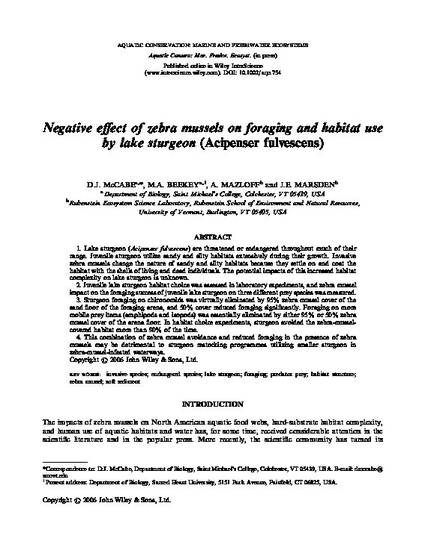
1. Lake sturgeon (Acipenser fulvescens) are threatened or endangered throughout much of their range. Juvenile sturgeon utilize sandy and silty habitats extensively during their growth. Invasive zebra mussels change the nature of sandy and silty habitats because they settle on and coat the habitat with the shells of living and dead individuals. The potential impacts of this increased habitat complexity on lake sturgeon is unknown. 2. Juvenile lake sturgeon habitat choice was assessed in laboratory experiments, and zebra mussel impact on the foraging success of juvenile lake sturgeon on three different prey species was measured. 3. Sturgeon foraging on chironomids was virtually eliminated by 95% zebra mussel cover of the sand floor of the foraging arena, and 50% cover reduced foraging significantly. Foraging on more mobile prey items (amphipods and isopods) was essentially eliminated by either 95% or 50% zebra mussel cover of the arena floor. In habitat choice experiments, sturgeon avoided the zebra-mussel- covered habitat more than 90% of the time. 4. This combination of zebra mussel avoidance and reduced foraging in the presence of zebra mussels may be detrimental to sturgeon restocking programmes utilizing smaller sturgeon in zebra-mussel-infested waterways.
McCabe, D. J., Beekey, M., Mazloff, A., & Marsden, I. E. (2006). Negative effect of zebra mussels on foraging and habitat use by lake sturgeon (Acipenser fulvescens). Aquatic Conservation: Marine and Freshwater Ecosystems, 16(5), 493-500. Doi: 10.1002/aqc.754
